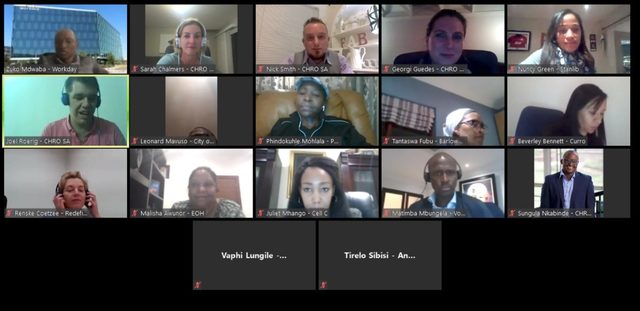CHRO Community Conversation reveals how much effort businesses are putting into safeguarding employees' wellbeing.
CHRO South Africa’s weekly Community Conversations are becoming a much-needed regular event on HR executives’ community calendar. These HR leaders relish the opportunity to connect with one another, take the temperature on decisions they are implementing, and be vulnerable in the company of peers when they have to be strong and confident for their teams.
Tuesday’s conversation touched on the topic of scenario planning. During the discussion, which was sponsored by Workday, Stanlib HR director Nuncy Green posed questions around the possible Covid-19-related outcomes that HR leaders and their respective executive teams were anticipating.
The subject matter was particularly relevant in light of the recent briefing from the Department of Health, which revealed that the pandemic is expected to peak in September rather than July as previously anticipated.
Said Nuncy: “I’m interested in hearing about the various scenarios that our organisations are considering and planning for post-lockdown. What policies, practices, cost-saving initiatives and budgeting strategies are we going to use? And what are we going to do from a wellness and employee engagement point of view as the country transitions out of lockdown? And what do we think the new normal will look like?”
The common thread throughout the evening was that HR leaders and their C-suite colleagues are doing everything in their power to ensure that no employee – whether they were a cleaner, receptionist, line manager, or executive – would have to lose their job as a result of the pandemic.
Executives were considering all options available – from ‘salary sacrifices’ to downsizing head office – not only for their organisations’ survival but for that of their employees.
OUTsurance chief people officer Suren Naidoo said, “A big part of our response has been to support our smaller service providers, clients and community at large. Because it’s not much help for us to be able to withstand the financial strain of Covid-19 if all our suppliers, service providers, and clients don’t.
Vodacom group CHRO Matimba Mbungela said that when the lockdown is over, consumers would be feeling even more challenges than they are now as the economy continues to be depressed with limited spending power. This could drive companies to offer more deals and discounts to incentivise spending, which would be a risk in itself because it executives still have to be mindful of the impact that this will have on the company’s long-term sustainability.
EOH HR director Malisha Awunor had only just joined the company by the time lockdown started but said she had been blown away by the speed at which they have been able to respond, with their technicians building the website for the Solidarity Fund in under 48 hours, making it possible for South Africans to donate to the fund.
While EOH was among the first companies to implement salary cuts, Malisha has been proud to be part of a team whose primary focus is to preserve jobs.
[chro-cta slug=chro-south-africa-s-weekly-community-conversations]
“We cannot adopt a cookie-cutter approach. We have to respond in accordance with the specific diverse dimensions in our respective businesses. Most importantly, it’s about balancing out how we are going to get through this with our people and having something sustainable to build upon going forward.”
Sameera Ahmed, strategy and transformation executive at Marshalls World of Sport said that, as a sporting business, their online revenue streams had been heavily affected and that their teams were already devising scenarios for how they were planning to react. In addition to a reduction of salaries by scale, whereby Employees below middle management are not affected, no dividends will be paid for the next 18 months while the executive leadership team will forego increases and incentives. They have also introduced a payment holiday with their pension provider and have a ‘rainy day fund”, which can be dipped into if necessary.
“Payment arrangements have been made with suppliers, landlords, banks, and so forth. Salaries are our number one priority, therefore, payment holidays have been secured to increase cash flow,” said Sameera.
“The biggest lesson has been around culture and how to create an environment where people feel secure while also creating a future skill set for the workforce to build resilience,”
Having heard from one another in separate breakout rooms, HR leaders were clear about one thing – forums like the CHRO Community Conversations are a godsend because the discussion enables them to return to their organisations with the confidence that they are not alone and that, while not perfect, everything they are doing and putting in place is consistent with their colleagues’ collective mindset around the issue.











